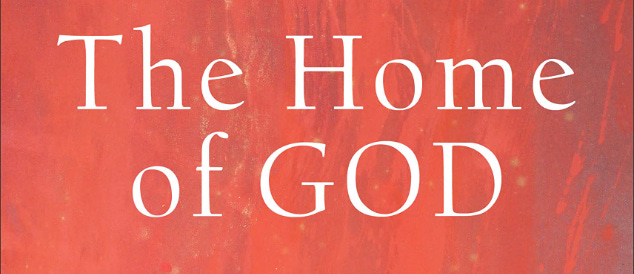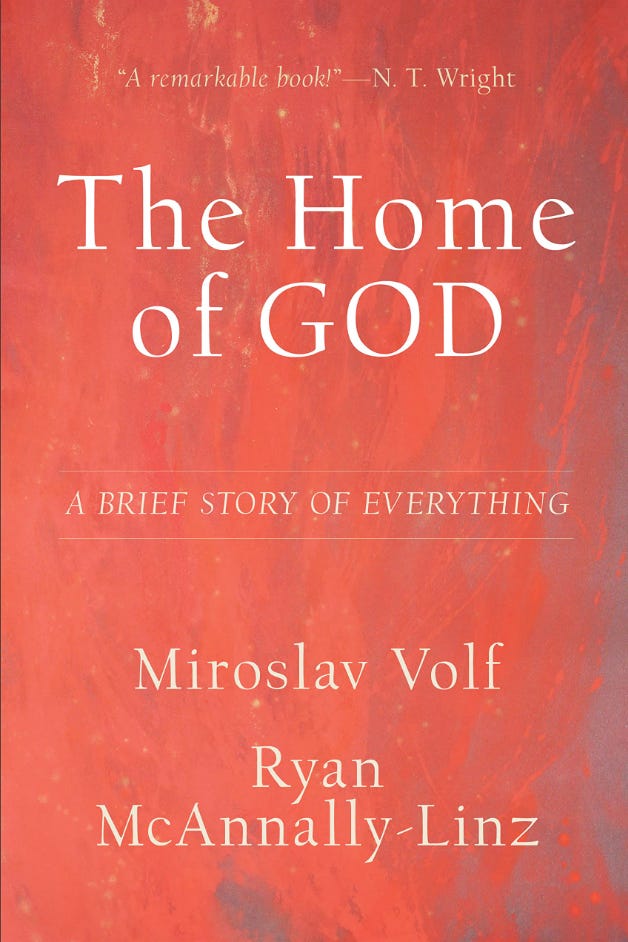The operative word in Miroslav Volf and Ryan McAnnally-Linz’s book, The Home of God: A Brief Story of Everything, is home. God creates and God makes a home with us, and Adam and Eve and humans de-home creation and God become absent from that “with us” kind-of-home, and redemption is about liberating humans from their de-homing and un-homing as God makes a home with us again. God secures a people with whom God will dwell by making a home-making covenant with them. That’s Genesis and Exodus in their story of everything.
Then the authors jump ahead to the Gospel of John, especially John 1:1-14, in a chapter called “God Coming Home.”
In this chapter, but not until the end, the authors make the case that the soteriological scheme of so much Christian theology sells the Bible’s vision short. God’s covenant is not simply to save, though that it does, but instead salvation has a design and direction: So God can once again be at-home with those who want to dwell at home with God.
The Gospel of John (GJohn) begins where the book of Exodus ends. That is, “the God of Israel fulfilling creation by coming to indwell earthly space so as to be among humans.” Notice this, and this is the gravitas of this chapter, “the tabernacle has become a living human body.” All of this shifts our conceptions of God, how we understand “God’s ultimate goal with creation,” and what humans are and how they relate with God. The past did not change, but our perception of the past does – sounds like Richard Hays Reading Backward. And, what we perceive is that “radical and irrevocable grace defines the home-making work of God in a world in the grip of sin and its dysoikic and un-homing power.”
In GJohn 1 we see that God comes (when God chooses to come) “to his own,” and that “own” has an “all the world” theme, a particularist theme (Israel, believers) and a universal theme (for the whole world), but “his own did not receive him,” which does not disrupt the love of God for all creation.
The major contribution of this home-making God is the arrival of God in Jesus Christ. Three times in GJohn Jesus is called “God” (1:1, 18; 20:28). This has the challenge that God = Father most often in GJohn, Jesus is in some sense dependent on God the Father, and God the Father and God the Son talk to one another. Hence, in GJohn we find the “full divinity of Jesus” as well as “his distinction from the Father.”
The I AM sayings reveal that “That God, the I AM, took on flesh in Jesus.” And, “in John Jesus just is the God of Israel come in the flesh.”
The Word: The Word is “on the side of the one and only Creator” (1:1: the Word was God), was with God from the beginning and “stands primordially facing God.” This creates nothing less than a reciprocal relation of Father and Son.
Again, this is the arrival and presence of the home-making God, the tabernacle and temple taking on flesh in Jesus.
“I and the Father are One”: “As God-distinct-from-God, he is one with God.” Their identity shapes their inseparable operations. They mutually indwell one another and here the authors bring to the table the idea of perichoresis in which “each act of the one is also an act of the other.” This indwelling of Father and Son has soteriological and ethical consequences for Father, Son, and Spirit not indwell one another they indwell believers and believers are in them, too.
Jesus does the Spirit’s work, too. The Spirit does the work of Jesus. GJohn has this oneness and perichoresis theme that only over time gets spelled out, but it can be seen in GJohn.
So, GJohn knows three things: The Word/Son is God, the Word/Son is distinct from God/the Father, and God is indissolubly one.
Jesus, too, is human. “God in Flesh.” God arrives for the home-making as “the Word-become-flesh” (1:14). God, thus, is revealed and reveals “in the flesh.” Jesus, as God in the flesh, is the exemplary human. Yes, that means the “abundant life and half-destroyed life would coincide; death and life would be one.” The home-making God and crucifixion.
In riffing off how many have used Anselm, the authors broaden scope from incarnation as soteriology as incarnation as “the way God Comes to the world to dwell with and in human beings, to give them true and eternal life, and thus bring God’s intention for creation to fulfillment.”






The scope of “kingdom”, like the old VBS song, becomes deep and wide, and it doesn’t require the Starship Enterprise to seek out and discover. It’s not an ideological place, but It’s here to live into. It becomes more real than ever. In a Pauline way, The Law is Morphing/has morphed into The Life. The Way opens The Truth, which opens to The Life! Thank you!
I agree with Pamela - this is “profoundly meaningful”!
Finding the faith and strength to unplug from “The Matrix”!
This is so good—speaking of the at-home, with-us, God. It shows God’s design, direction and desire. Thank you!
“God’s covenant is not simply to save, though that it does, but instead salvation has a design and direction: So God can once again be at-home with those who want to dwell at home with God.”